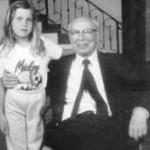Bruno Bettelheim born in Vienna
Bettelheim is born in Vienna of a non-religious middle-class Jewish family. As a child, Bettelheim is entrusted to a wet-nurse, but when he falls ill, his mother takes care of him. His childhood is happy at first, spent in a loving and numerous family (Bettelheim has fourteen aunts and uncles). At age four he contracts life-threatening dysentery. His is influenced by fairy tales:
The literature, which exerted a strong influence on me at the very beginning, were fairy tales, the first my mother told me, and I read itself. But I can not remember exactly whether these stories had a formative force for me. However, this must have been the case, because otherwise I would not have tried, aged over the years, to understand their psychological meaning for children. (…) How and in what way tales for me were at that time so important, I can not fathom today, but I’m pretty sure the reason being that they were telling me mainly from my mother
His father runs a wood factory, but loses a large part of its assets in the First World War, and has a stroke in 1918. He remembers his father as a weak, broken man who was no longer able to take responsibility for his family in times of change. The relationship between his mother and father deteriorates when she discovers that her husband has caught syphilis from a prostitute. His father becomes anxious and depressed, because he is suffering from many other diseases.
Sent to concentration camp
After spending three days in Vienna, Bettelheim is transferred to Dachau concentration camp for four months and then to Buchenwald. His wife goes to the United States. Later Bettelheim deposes in a document signed L-73, saying that he was able to survive partly because he could understand the mental processes of the SS guards and officers.
I worked in at least 20 different labor groups whose number varied from 20 or 30 all the way up to a few hundreds. I slept in five different barracks, in each of which 200 or 300 prisoners lived. In this way I came to know personally at least 600 prisoners at Dachau (out of approximately 6,000) and at least 900 at Buchenwald (out of approximately 8,000). Although older prisoners of the same category lived together in barracks, all categories were mixed at work so that I was able to contact and interview prisoners of all types. The main different categories were : political prisoners; “work-shy” prisoners, that is, persons who did not agree to work wherever the government wanted them to work, or who had changed working places to get higher wages, etc.; former members of the French Foreign Legion and spies; Jehovah’s Witnesses and other conscientious objectors; Jews; criminals; and other groups, e.g. former members of such suppressed Nazi groups as the followers of Roehm who were still alive. I was thus afforded an opportunity of interviewing all different groups and in this way secured an adequate sampling. was able to find only two other persons whose intelligence and training qualified them to participate in my investigation. These individuals spoke to several hundred prisoners. Every day during the morning count of the prisoners, while waiting for assignment to labor groups, reports were exchanged, and theories discussed. These talks proved very helpful in clarifying mistakes due to taking a one-sided viewpoint.
Influential friends in America ask the State Department to pressure the German authorities for his release and he is set free in April 1939.
Becomes Sonia Shankman Orthogenic School director
Bettelheim is asked by Tyler, his protector and his mentor, to report on the Sonia Shankman Orthogenic School, which treats mentally retarded children. Bettelheim does not submit his report; he is reluctant to tell his mentor that he thinks the school is such a dump that it should be burned down. However, Tyler persists and offers Bettelheim the position of director of school Director.
Weinfeld Bettelheim dies age 72
Weinfeld “Trude” Bettelheim dies in Menlo Park, CA age 72. After forty-three years of marriage, Bruno is devastated. A brief live-in arrangement with a son ends when difficulties arise between them, and Bettelheim moves into a condominium, where he lives alone.
BBC Horizon documentary
The BBC’s Horizon program profiles Bettelheim. The documentary goes back over his period in the concentration camps and his psychoanalytic work with autistic children.
The best way to understand the terrorization under which one lived was the situation when a friend of one was killed mercilessly, purpose in front of one’s eyes and one couldn’t do anything. This was one for the tremendous conflicts. Should one try and help a friend, and be likely killed; or should one not, and have to live with the fact that one didn’t come to the rescue. This was probably one of the most demoralizing experiences in the camp, to me personally.
He describes a particular situation:
A group of prisoners had xx against the Gestapo. The SS men ordered them to dig some ditches and to lay down in them, and then ordered another group of prisoners to shovel dirt on them and suffocate them. The prisoners, out of fear for their own lives, obeyed the order without any resistance, and began to shovel dirt on the prisoners. But before they were suffocated the SS men ordered the prisoners to be killed to get out of the trenches, and ordered those who were willing to kill their comrades to lie down in the trenches, and now those who were first to be murdered had to shovel dirt on them. Which they did only because these people had been willing and ready to murder them.
Suffers a stroke
Bettelheim suffers from a stroke that leaves him unable to think and process information as he had earlier. The stroke is not particularly severe, but prevents him from writing his books and essays. He complains of residues from the stroke, including frustration about physical activity, a pervasive feeling that his body was betraying him; he walks with a slight limp and needs a cane for assistance; he is no longer able to exercise by walking long distances. The stroke also impairs his handwriting and his capacity to type, severely inhibiting the composition of his books and articles. Like many stroke victims, Bettelheim’s emotional state oscillates between depression and anguish.
Bruno Bettelheim commits suicide age 86
Bettelheim is found dead on the floor of his apartment in a Maryland nursing home, a plastic bag over his head and barbiturates in his bloodstream.


